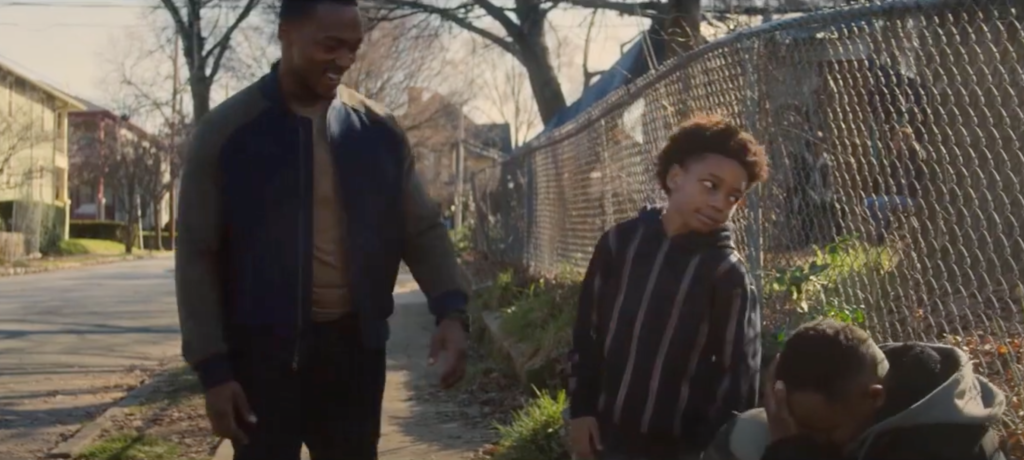Sam Wilson and Bucky Barnes stroll through a Baltimore hood on the way to visit Isaiah Bradley, soon revealed as an American super solider in hiding (he’s the last survivor of an unethical U.S. government experiment on Black men). On their way, two kids hanging out on the sidewalk recognize Sam. One boisterously calls out:
“Hey it’s Black Falcon!”
“Just Falcon, kid,” Sam replies quickly and unamused. Assuredly, the kid relays a piece of wisdom from his father.
“No no, my daddy told me it’s Black Falcon.”
“Is it, because I’m Black, and I’m the Falcon?”
“Well, technically…I mean, yes?”
“So are you, like, Black Kid?”
The kid’s friend holds back a chuckle. Sam, pleased with his retort, laughs and lightly taps the other kid’s arm as he declares, “I got ’em, right?”
Just minutes later, after a brief and unsuccessful talk with Mr. Bradley, Sam and Bucky are stopped by two police officers. More accurately, they pull up with their police lights flashing, jump out the car and immediately begin to question Sam as they walk up to the bickering super duo. The scene has as much subtlety as a stone in soup.
Things get testy and only de-escalate when Bucky, who initially asked Sam to comply with an arbitrary ID check, annoyedly asks the cops, “Do you know who this guy is?”
After Cop 2 whispers Sam’s hero identity into Cop 1’s ear, Cop 1 profusely apologizes. Too little too late, though–Sam is now painfully reminded that he is indeed *sniffles* Black Falcon.
In a show that makes terrorist third wheel Helmut Zemo complex and quite likable, you’d think they could do better by their Black co-lead.
At the end of the day, Falcon and the Winter Soldier is a Marvel product. Meaning it’s Disney. Meaning we’ll get a story as compelling as possible that plays legally blind to the realities it is based on. As much as that means the show avoids controversy, it also means the show often shoots jumpers into the crowd convinced it’s draining corner 3s.
With scenes like Falcon’s racial karma in Baltimore, Falcon being clowned for calling his aunt “Titi,” and fake Captain America scoring a revenge kill in broad daylight, you get the sense Marvel doesn’t realize where this show is headed. But the tropes are so obvious to any American who was conscious this past decade, you get the sense Marvel does know what it’s doing.
Are the writers aware fake Cap embodies white male rage and the worst of American imperialism, or is it just a gripping good-guy-gone-bad story? Either way, it’s worth our time and a reaction.
Is Sam’s half-baked racial reckoning meant to build up to a consequential choice about his allegiance to the country he proudly serves? Maybe. Just as likely is the writers deciding if Sam is “just Falcon” or a proud Black man (e.g. Marvin Gaye discussion on the plane) on a scene-by-scene basis with no real aim except to keep their messaging flexible. Either way, we watch.
If you’re watching Falcon and the Winter Soldier to renew your excitement for the MCU and see juuuust enough of the real world reflected in TV, the show is dope. Like a roller coaster or a haunted house, you believe in the security of the ride enough to play along with the twists and turns.
Of course Falcon will get over racism and his empathy for an anarchist to fight for ‘Murica. And Fake Captain America is concerning, but of course he doesn’t represent what America’s really about. Sam and Bucky were being jerks to him and he just has big shoes to fill. His murderous mental break says nothing about the U.S.A’s place in the world…
Needless to say, if you’re looking for sharp commentary on the United States’ internal problems and external image, you won’t get it here. Relevant? Sure, only in the sense that the show is set in and alludes to today’s problems. But valuable? Timely? Not so much.
In a show that makes terrorist third wheel Helmut Zemo complex and quite likable, you’d think they could do better by their Black co-lead.
On another note, I love the occasional viewer who thinks Falcon and the Winter Soldier is too woke. Here I am discussing the impact of white capitalists taking the criticism they face and selling it back to us, and there are others that lose it at the sound of the word “Black”:
As far as Disney goes, upsetting bigots and liberation-minded people is fine as long as everyone in between thinks the show is edgy and thrilling. Commercially speaking, Marvel’s foray into streaming has gone as well as possible.
Socially speaking, Falcon and the Winter Soldier is a visible example of why “Representation Matters” is a limp, weightless slogan. What’s the point of more Black leads if their stories are molded to a white-owned megacorporation’s liking? What’s the point of Marvel addressing race if it won’t address race? And great, fake Cap has a Black sidekick too.
But yes, I’m going to watch the rest of this season.
UPDATE 4/26/2021:
Having now watched the season finale, I stand by the commentary and rhetorical questions asked in this piece. Sam’s speech, the climactic moment of the season, felt unearned and limp considering how speciously his identity and relationship to America was explored. Not to mention Bucky, the supposed co-star, barely had screen time for his therapeutic breakthrough.
In the grand scheme of thing, this show did what it had to do: set the stage for a new wave of Captain America films. The integrity of this new wave’s foundation, though, is shaky.
UPDATE 3/31/2022: edited for formatting, syntax, punctuation, and vernacular (i.e. “TT” edited to “Titi”)
